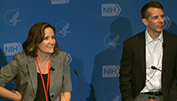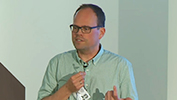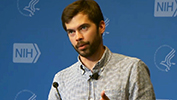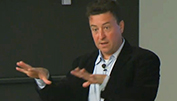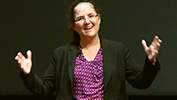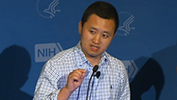-
- NIH VideoCast - NCI Board of Scientific Advisors and the National Cancer Advisory Board - June 2017 (Day 2)
-
- - NCI, NIH (2017/06/23)
- - Category : NCI Board of Scientific Advisors
- The 9th Joint Meeting of the NCI Board of Scientific Advisors and the National Cancer Advisory Board
NIH VideoCast - NCI Board of Scientific Advisors and the National Cancer Advisory Board - June 2017 (Day 2)
-
- NIH VideoCast - CC Grand Rounds: Eltrombopag in Aplastic Anemia: Making Blood Stem Cells Great Again
-
- - 1) Danielle Townsley, MD, MSc Staff Clinician, Hematology Branch, NHLBI, NIH and 2) Andre Larochelle, MD, PhD Tenure-Track Investigator, Regenerative Therapies for Inherited Blood Disorders, Hematology Branch, NHLBI, NIH (2017/06/23)
- - Category : Clinical Center Grand Rounds
- CC Grand Rounds: Eltrombopag in Aplastic Anemia: Making Blood Stem Cells Great Again
For more information go to http://www.cc.nih.gov/about/news/grcurrent.html
NIH VideoCast - CC Grand Rounds: Eltrombopag in Aplastic Anemia: Making Blood Stem Cells Great Again
-
- NIH VideoCast - Structural biology of gene, epigenetic and immune regulation
-
- - Dinshaw J. Patel, Ph.D., Member and Laboratory Head, Memorial Sloan-Kettering Cancer Center (2017/06/23)
- - Category : WALS - Wednesday Afternoon Lectures
- NIH Director???s Wednesday Afternoon Lecture Series
The role of RNA in information transfer and catalysis highlights its dual functionalities. Much of Dr. Patel`s laboratory effort in this area has focused on metabolite-sensing riboswitches and nucleolytic self-cleaving ribozymes on the one hand, and on CRISPR-Cas systems on the other. His WALS lecture will provide a few examples of the principles underlying metabolite recognition by riboswitches; his lab`s studies on catalytic mechanisms adopted by nucleolytic ribozymes; recent x-ray and cryoEM studies on ternary complexes of Cas nucleases and multisubunit cascades with bound crRNA and target DNA; and the impact of anti-CRISPR proteins in suppressing the CRISPR-Cas host-defense pathway.
For more information go to https://oir.nih.gov/wals
NIH VideoCast - Structural biology of gene, epigenetic and immune regulation
-
- NIH VideoCast - NETting the web in systemic autoimmunity
-
- - Mariana Kaplan, M.D., Senior Investigator, Chief of the Systemic Autoimmunity Branch, NIAMS, NIH (2017/06/23)
- - Category : Immunology
- Immunology Interest Group Seminar Series
Mariana Kaplan, M.D. is Senior Investigator and Chief of the Systemic Autoimmunity Branch at NIAMS/NIH. Prior to her appointment, she was Professor of Medicine in the Division of Rheumatology at the University of Michigan. Dr. Kaplan obtained her medical degree at the National Autonomous University of Mexico and did her Internal Medicine Residency at the National Institute of Medical Sciences and Nutrition in Mexico City. Dr. Kaplan did her Rheumatology Fellowship and postdoctoral training at the University of Michigan, where she was a member of the faculty for 15 years, and an active member of their Multidisciplinary Lupus Clinic. Dr. Kaplan`s research has focused on identifying mechanisms of organ damage and premature vascular disease in systemic autoimmunity. More specifically, she investigates how innate immunity (in particular, type I interferons and myeloid cells) promote end-organ damage in systemic lupus erythematosus, rheumatoid arthritis and other systemic autoimmune diseases. Recently, her research has focused on identifying abnormalities of neutrophil subsets and the role of neutrophil extracellular traps (NETs) in lupus and rheumatoid arthritis, both of which may contribute to the development of autoimmune responses and to end-organ damage. Dr. Kaplan also has an interest in identifying novel therapeutic targets that may prevent premature vascular damage in systemic autoimmunity, as well as the role of environmental triggers in the induction of autoimmunity. Moreover, she has led clinical trials to identify mechanisms that reduce blood vessel dysfunction in autoimmune and chronic inflammatory disorders.
In addition to her research activities, Dr. Kaplan is an active clinician and teacher. She sees lupus patients in the NIH Clinical Research Center and is involved in the development of various clinical trials for patients with autoimmune diseases at NIH. She has served in various roles at the American College of Rheumatology/ Rheumatology Research Foundation, the American Association of Immunologists, the Journal of Immunology, and the Lupus Foundation of America. She was elected to the American Society for Clinical Investigation and the American Association of Physicians and has received many awards. Among them, she received the Henry Kunkel Young Investigator Award and the Edmund L. Dubois Memorial Lectureship, both from the American College of Rheumatology. Dr. Kaplan received the 2015 Evelyn V. Hess Award from the Lupus Foundation of America in recognition of her significant contributions to lupus research, diagnosis, and treatment and the 2016 Charles L. Christian Award for significant impact in the understanding of lupus.
NIH VideoCast - NETting the web in systemic autoimmunity
-
- NIH VideoCast - National Advisory Eye Council (NAEC) - June 2017
-
- - NEI Council (2017/06/20)
- - Category : Advisory Board Meetings and Workshops
- Paul A. Sieving, MD, PhD, the Director of the National Eye Institute (NEI), presides as Chair and Paul A. Sheehy, Ph.D., as Executive Secretary to the National Advisory Eye Council (NAEC). The meeting is open to the public from 08:30 a.m. until 12:35 p.m. then the meeting will be closed to the public for the review of confidentiality and conflict of interest procedures and a review of grant and cooperative agreement applications on visual disorders, preservation of sight, and the special health problems and requirements of individuals with visual impairments. It also conducts the second level peer review of grant applications.
For more information go to https://nei.nih.gov/about/naec
NIH VideoCast - National Advisory Eye Council (NAEC) - June 2017
-
- NIH VideoCast - Imaging lesion development and repair in multiple sclerosis
-
- - Daniel S. Reich, MD, PhD, Chief,Translational Neuroradiology Unit, Neuroimmunology Branch, National Institute of Neurological Disorders and Stroke, NIH (2017/06/20)
- - Category : NIH Director`s Seminars
- NIH Director`s Seminar Series
Does the white matter lesion in multiple sclerosis (MS) still matter in the age of highly effective disease-modifying therapy, which acts primarily to stop new lesions from forming? Evidence suggests that it does ??? not just because the most effective therapies are also the riskiest, but also because therapies that stop new lesions from forming do not appear to impact chronic inflammation or enhance repair. In this seminar, Dr. Reich will discuss his lab???s findings from the past few years about the development and early repair of white matter lesions in MS, and how those findings are mirrored in inflammatory demyelinating lesions in a primate model of MS. Dr. Reich will describe pathological changes that occur prior to demyelination and show how failed early repair can lead to smoldering inflammation at the lesion edge, with its attendant slow myelin destruction. He will also report on progress in imaging the recently described meningeal lymphatic system.
NIH VideoCast - Imaging lesion development and repair in multiple sclerosis
-
- NIH VideoCast - What the mouse`s eye tells the mouse`s brain
-
- - Thomas Euler, Ph.D., Professor, Werner Reichardt Centre for Integrative Neuroscience (CIN), Institute for Ophthalmic Res., University of Tubingen, Germany (2017/06/20)
- - Category : Neuroscience
- NIH Neuroscience Series Seminar
For more information go to https://neuroscience.nih.gov/neuroseries/Home.aspx
NIH VideoCast - What the mouse`s eye tells the mouse`s brain
-
- NIH VideoCast - Repetitive DNA sequences in health and disease: gift wrappings for precision medicine
-
- - Ken Ramos, M.D., Ph.D., Associate Vice President for Precision Health Sciences; Interim Dean of the UA College of Medicine, Phoenix; Executive Director, Center for Applied Genetics and Genomic Medicine; Professor of Medicine, University of Arizona Health Sciences (2017/06/16)
- - Category : WALS - Wednesday Afternoon Lectures
- NIH Director???s Wednesday Afternoon Lecture Series
Dr. Ramos is recognized as a leading expert in the study of gene-gene and gene-environment interactions and genomic medicine. His research program integrates diverse approaches, ranging from molecular genetics to population-based public health studies in efforts to understand the genetic and genomic basis of human disease and to advance the goals of precision medicine. Ongoing basic science studies in his laboratory focus on repetitive genetic elements in the mammalian genome and their role in genome plasticity and disease, while his clinical work focuses on the characterization of diagnostic and prognostic biomarkers for chronic disease and cancer.
For more information go to https://oir.nih.gov/wals
NIH VideoCast - Repetitive DNA sequences in health and disease: gift wrappings for precision medicine
-
- NIH VideoCast - Interferon-induced transmembrane proteins block Zika virus infection and prevent a non-apoptotic, paraptosis-like cell death pathway
-
- - Alex Compton, Ph.D., Head, Antiviral Immunity and Resistance Section, NCI, NIH (2017/06/16)
- - Category : Immunology
- Immunology Interest Group Seminar Series
The clinical outcome of viral infection, the difference between survival and death of the host, rests delicately on events occurring at the molecular level of individual cells. The ???cell-intrinsic??? arm of innate immunity prevents virus replication by detecting virus invasion and interfering with the viral life cycle. As such, cell-intrinsic immune factors, also known as host restriction factors, impose the earliest acting barriers to invading pathogens. Innate immunity controls Zika virus (ZIKV) infection and disease in most infected patients through mechanisms that remain to be understood. Furthermore, the cytopathic effects of ZIKV are widely discussed but poorly described. Here, we studied the morphological cellular changes induced by ZIKV and addressed the role of interferon-induced transmembrane proteins (IFITM), a family of broad spectrum antiviral factors, during viral replication. We report that ZIKV induces massive vacuolization followed by ???implosive??? cell death in human epithelial cells, primary skin fibroblasts and astrocytes, a phenomenon which is exacerbated when IFITM3 levels are low. It is reminiscent of paraptosis, a caspase-independent, non-apoptotic form of cell death associated with the formation of large cytoplasmic vacuoles. We further show that ZIKV-induced vacuoles are derived from the endoplasmic reticulum (ER) and dependent on the PI3K/Akt signaling axis. Inhibiting the Sec61 ER translocon in ZIKV-infected cells blocked vacuole formation and viral production. Our results provide mechanistic insight behind the ZIKV-induced cytopathic effect and indicate that IFITM3, by acting as a gatekeeper for incoming virus, restricts virus takeover of the ER and subsequent cell death. Future directions include determining whether additional antiviral functions of IFITM3, such as the reduction of HIV-1 virion fusogenicity, also manifest during flavivirus infections.
Alex Compton received his Ph.D. in Molecular and Cellular Biology from the University of Washington in 2012. As a doctoral student in the laboratory of Dr. Michael Emerman (Fred Hutchinson Cancer Research Center), he investigated the HIV-1 Vif protein and its target APOBEC3G, revealing lentivirus-driven evolution of host proteins on a million-year time scale. Dr. Compton was the recipient of a Pasteur Foundation Postdoctoral Fellowship and an ANRS (French National Agency on AIDS Research) Grant during his postdoctoral training with Dr. Olivier Schwartz at the Pasteur Institute in Paris, where he made key discoveries on the mechanisms by which the interferon-induced transmembrane (IFITM) proteins restrict HIV-1 infection. These studies provide important insight into the complex ways in which mammalian cells have evolved to counteract viral infections. In 2017, Dr. Compton joined the HIV Dynamics and Replication Program as Head of the Antiviral Immunity and Resistance Section to develop a research program focused on mechanisms of protection mediated by the cell-intrinsic innate immune response, as well as the strategies employed by HIV and emerging viruses to evade or overcome these immune barriers.
NIH VideoCast - Interferon-induced transmembrane proteins block Zika virus infection and prevent a non-apoptotic, paraptosis-like cell death pathway
-
- NIH VideoCast - CC Grand Rounds: Contemporary Clinical Medicine: Great Teachers: John Laws Decker Memorial Lecture: Interleukin-2: New Indications for an Old Cytokine
-
- - Sawa Ito, MD, PhD Staff Clinician, Hematology Branch, NHLBI, NIH and Associate Program Director, Hematology and Oncology Fellowship Program, NIH (2017/06/15)
- - Category : Clinical Center Grand Rounds
- CC Grand Rounds: Contemporary Clinical Medicine: Great Teachers: John Laws Decker Memorial Lecture: Interleukin-2: New Indications for an Old CytokineJohn Laws Decker Memorial Lecture
Interleukin-2: New Indications for an Old Cytokine
For more information go to http://www.cc.nih.gov/about/news/grcurrent.html
NIH VideoCast - CC Grand Rounds: Contemporary Clinical Medicine: Great Teachers: John Laws Decker Memorial Lecture: Interleukin-2: New Indications for an Old Cytokine
-
- NIH VideoCast - Advisory Committee to the Director - June 2017 (Day 2)
-
- - Office of the Director, NIH (2017/06/14)
- - Category : Advisory Committee to the Director of the NIH
- Advisory Committee to the Director
For more information go to https://acd.od.nih.gov
NIH VideoCast - Advisory Committee to the Director - June 2017 (Day 2)
-
- NIH VideoCast - NCI Council of Research Advocates Meeting - June 2017
-
- - Office of Advocacy Relations, NCI, NIH (2017/06/14)
- - Category : Advisory Board Meetings and Workshops
- 74th NCI Council of Research Advocates Meeting
In person meeting of NCRA board members and NCI Office of Advocacy Relations.
NIH VideoCast - NCI Council of Research Advocates Meeting - June 2017
-
- NIH VideoCast - Bringing Precision Delivery to Precision Medicine
-
- - Atul Gawande, M.D., M.P.H., Harvard T.H. Chan School of Public Health (2017/06/14)
- - Category : WALS - Wednesday Afternoon Lectures
- NIH Director???s Wednesday Afternoon Lecture Series
Dr. Gawande is a surgeon, writer, and public health researcher. He practices general and endocrine surgery at Brigham and Women???s Hospital in Boston, Massachusetts. He is Professor in the Department of Health Policy and Management at the Harvard T.H. Chan School of Public Health and the Samuel O. Thier Professor of Surgery at Harvard Medical School. He is also Executive Director of Ariadne Labs, a joint center for health systems innovation, and Chairman of Lifebox, a nonprofit organization making surgery safer globally.
Dr. Gawande has been a staff writer for The New Yorker magazine since 1998 and has written four New York Times bestsellers: Complications, Better, The Checklist Manifesto, and most recently, Being Mortal: Medicine and What Matters in the End. He is the winner of two National Magazine Awards, Academy Health???s Impact Award for highest research impact on healthcare, a MacArthur Fellowship, and the Lewis Thomas Award for writing about science.
For more information go to https://oir.nih.gov/wals
NIH VideoCast - Bringing Precision Delivery to Precision Medicine
-
- NIH VideoCast - Federal Pain Research Strategy Forum and Public Comment Period
-
- - NIH (2017/06/13)
- - Category : Conferences
- The Federal Pain Research Strategy is a long term strategic plan to coordinate and advance the federal pain research agenda. The workgroups developed a set of prioritized research recommendations which will be presented for public comment.
For more information go to https://iprcc.nih.gov
NIH VideoCast - Federal Pain Research Strategy Forum and Public Comment Period
-
- NIH VideoCast - Integrating Chemical and Biological Profiling for the Functional Annotation of Complex Natural Product Mixtures
-
- - Roger Linington, Ph.D. Associate Professor, Department of Chemistry, Simon Fraser University, British Columbia and Canada Research Chair, High-Throughput Screening and Chemical Biology (2017/06/13)
- - Category : National Center for Complementary and Integrative Health
- The National Center for Complementary and Integrative Health (NCCIH) presents the integrative Medicine Research Lecture Series. The series provides overviews of the current state of research and practice involving complementary health approaches and explores perspectives on the emerging discipline of integrative medicine.
It is challenging to identify the active components within complex mixtures of natural products and understand their modes of action. Thanks to recent technological developments in analytical chemistry and high-content screening, researchers have new opportunities to address tough questions posed by natural product profiling.
Dr. Linington???s laboratory is developing new methods for the unbiased chemical characterization of natural product mixtures as part of a collaborative program funded by the National Center for Complementary and Integrative Health and the Office of Dietary Supplements. They are also creating new informatics tools to relate the presence or absence of specific metabolites to observations of biological phenotypes in profiling assays. Together, these systems are providing a broad perspective on the biological roles of all metabolites in complex samples.
During this lecture, Dr. Linington will share his perspective on potential solutions for the unbiased chemical characterization of complex natural product mixtures, discuss the advantages of high-content assay systems for target-agnostic biological profiling, and highlight opportunities provided by the integration of orthogonal datasets for the functional characterization of natural product samples.
Dr. Linington is part of a new generation of natural products researchers invested in the biological attributes of natural products leads. He explores the general areas of natural product drug development and the exploration of natural products as chemical genetic tools. His research program has focused heavily on the development of new multiparametric screening tools for the early prediction of compound modes of action from primary screening data, and the development of new, more efficient compound isolation and structure elucidation methods.
Early in his academic career, Dr. Linington???s research focused on the discovery of novel bioactive molecules from natural sources as lead compounds for drug development. The targets of these drug discovery efforts included pathogenic bacteria, cancer cell lines, and global health diseases, with a particular focus on protozoan parasites. This work led to the identification of a number of important molecules that have been studied by his group and others in the years since their discovery. Examples of these discoveries include the identification of gallinamide A from a Panamanian marine cyanobacterium, which displays very potent and selective activity against Plasmodium falciparum (the parasite that causes malaria), and which has recently been shown to function by inhibition of falcipain and cathepsin L, both at nanomolar concentrations. More recently, his group has discovered the lobosamide class of polyketides, which are potent lead compounds with large windows of efficacy against T. brucei, and used genome-guided discovery tools to identify other compound in this class from different producing organisms. His work in this area has included a strong emphasis on kinetoplastid parasites, and has resulted in numerous publications describing the discovery, medicinal chemistry optimization, and target identification for a variety of different compound classes.
For more information go to https://nccih.nih.gov/news/events/IMlectures
NIH VideoCast - Integrating Chemical and Biological Profiling for the Functional Annotation of Complex Natural Product Mixtures
-
- NIH VideoCast - Cell-type-specific STORM superresolution imaging of synaptic cannabinoid signaling
-
- - Istvan Katona, Ph.D., Researcher, Institute of Experimental Medicine, Hungarian Academy of Sciences (2017/06/13)
- - Category : Neuroscience
- NIH Neuroscience Series Seminar
Synaptic junctions are major sites of communication in the brain, where chemical messenger molecules transmit information from presynaptic neurons to their postsynaptic partners. The efficacy of synaptic transmission is not constant in time and space. Instead, its plasticity is a fundamental phenomenon underlying information storage and adaptation to environmental stimuli. Although classical neurotransmitters (such as glutamate and GABA) have well characterized principal roles in mediating basal neurotransmission, emerging evidence has revealed that synapses exploit a plethora of additional messenger molecules integrated into sophisticated signaling pathways to accomplish their complex functions. Thus, the major objective of Dr. Katona???s laboratory is to identify new signaling systems regulating synaptic transmission and its plasticity. They aspire to delineate the molecular architecture of these novel pathways and to elucidate their physiological roles. Ultimately, this activity is envisaged to help gain a better understanding of synaptic function and reveal new aspects of impaired synaptic activity in brain disorders.
For more information go to https://neuroscience.nih.gov/neuroseries/Home.aspx
NIH VideoCast - Cell-type-specific STORM superresolution imaging of synaptic cannabinoid signaling
-
- NIH VideoCast - Translational traps: sex and aging in stroke research stroke research
-
- - Louise D. McCullough, M.D., Ph.D., Professor and Chair, Department of Neurology at McGovern Medical School, University of Texas Health Science Center; Chief of the Neurology Service at Memorial Hermann Hospital-Texas Medical Center (2017/06/10)
- - Category : WALS - Wednesday Afternoon Lectures
- NIH Wednesday Afternoon Lecture Series
Dr. McCullough???s research interests primarily focus on: 1) understanding sex differences in ischemic cell death 2) age related inflammation and 3) social factors in stroke recovery.
Basic molecular and animal studies in males and females have direct translational relevance, as treatments have revealed the efficacy in one sex has paradoxically shown a detrimental effect in the other sex. This is now increasingly recognized in clinical stroke populations.
Another important area of Dr. McCullough???s research is understanding the genetic and hormonal differences in inflammation across the life span. The immune response to stroke differs in aged animals and elderly stroke patients. Studies in her laboratory are investigating the role of inflammation in stroke recovery. Current studies are manipulating age-related inflammation using bone marrow transplants, parabiosis and microbiome transfers. Factors such as depression and social isolation also dramatically impact recovery and mortality after experimental stroke as well as in stroke patients. Mechanisms currently being investigated are microRNA regulation of microglia and microbiome alterations with depression.
For more information go to https://oir.nih.gov/wals/2016-2017/translational-traps-sex-aging-stroke-research
NIH VideoCast - Translational traps: sex and aging in stroke research stroke research
-
- NIH VideoCast - The plasticity and migratory responses of innate lymphoid cells: more similarity to T cells than you thought
-
- - Yuefeng ???Tony??? Huang, PhD, NIAID, NIH (2017/06/10)
- - Category : Immunology
- Immunology Interest Group Seminar Series
The identification of innate lymphoid cells (ILCs) was a major step forward in developing a better understanding of host defense. Although ILC lack the capacity for antigen recognition, they show striking similarities with T cell subsets in both the transcription factors that govern their differentiation and the effector cytokines they produce. One major difference in the existing concepts of ILC and adaptive T cell responses is that the former are considered to act largely as tissue resident effectors whereas T cells migrate from secondary lymphoid tissues of activation to peripheral tissue locations where they mediate effector activity. However, our studies suggest that ILCs may share a greater relationship with T cells in terms of biology than previously considered. Our analysis of inflammatory ILC2 cells revealed that after activation in the intestinal lamina propria upon IL-25, these iILC2s entered the lymphatic and then blood circulation in an S1P-depndent manner, migrating to lung and other peripheral sites where they mediate crucial protection during helminthic infection. These data suggest that the current paradigm of local activation and distant function for T cell-mediated immunity actually borrows from a mode of operation already present in innate lymphoid cell populations prior to development of antigen specific host defenses.
Yuefeng ???Tony??? Huang obtained his PhD degree from Shanghai Institute of Biochemistry and Cell Biology, Chinese Academy of Sciences, where he studied the cross talking between apoptosis and antiviral responses. He joined Laboratory of Immunology, NIAID in 2012 as a postdoctoral fellow. He has studied the biology of innate lymphoid cells under the mentorship of Bill Paul and then Ron Germain, and he is an awardee of K99/R00 Pathway to Independence Grant. In his seminar, Tony will present his journey from identification of ???inflammatory ILC2??? and its plasticity to his more recent discovery that inflammatory ILC2s are not tissue resident but circulating cells, which arise from the gut but can offer crucial protection in the lung during helminthic infection.
NIH VideoCast - The plasticity and migratory responses of innate lymphoid cells: more similarity to T cells than you thought
-
- NIH VideoCast - NICHD Advisory Council Meeting - June 2017
-
- - NICHD, NIH (2017/06/10)
- - Category : National Institute of Child Health and Human Development
- To help achieve the goals of the Institute, the NACHHD Council is charged with advising, consulting with, and making recommendations to the NICHD director on matters relating to the research and research support activities and functions of the Institute.
NIH VideoCast - NICHD Advisory Council Meeting - June 2017
-
- NIH VideoCast - Advisory Committee to the Director - June 2017 (Day 1)
-
- - Office of the Director, NIH (2017/06/10)
- - Category : Advisory Committee to the Director of the NIH
- Advisory Committee to the Director
For more information go to https://acd.od.nih.gov
NIH VideoCast - Advisory Committee to the Director - June 2017 (Day 1)




